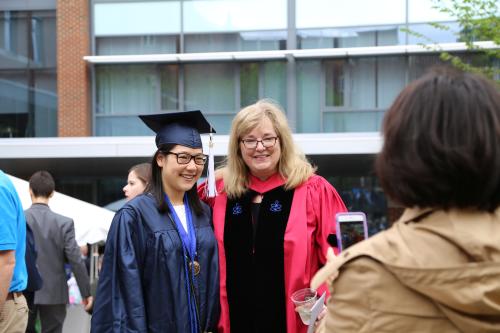Alumni Spotlight:
Featuring Sarah Chang
In this edition of BMB’s Alumni Spotlight, we feature Sarah Chang.

Currently Sarah is an MD/PhD student at Harvard Medical School and the Massachusetts Institute of Technology (MIT), located in Boston and Cambridge, Massachusetts. Majoring in Biochemistry and Molecular Biology, she earned her Bachelor of Science degree in 2016. As an undergraduate researcher, she worked in the Hanna-Rose Laboratory under the mentorship of Professor of Biochemistry and Molecular Biology, Wendy Hanna-Rose, investigating how two mitochondrial proteins regulate aging.
In the fifth year of her MD/PhD program, she is completing her PhD at the Koch Institute for Integrative Cancer Research and the Department of Biology at MIT. She is conducting her research in the laboratory of Professor of Biology, Matthew Vander Heiden, where she is studying cancer cell metabolism.
You can follow Sarah on Twitter.
Let’s chat with Sarah, talk about her experiences while at Penn State, what inspires her, and catch up with what she’s been up to.

What is the nature of your research at Harvard Medical School and the Massachusetts Institute of Technology (MIT)?
I'm interested in understanding how the metabolism of cancer cells is different than normal cells so that we can develop new, and more targeted, methods of inhibiting tumor growth. Specifically, I'm uncovering how cancer cells rewire their metabolism to grow in multiple nutrient environments, which are vastly different across organs in the body. By understanding how cancer cells adapt to their nutrient environments, we can better inhibit cancers from growing and spreading.
What was it that made you want to come to Penn State, and BMB, to pursue your education?
As a State College native, I was always aware of the strong research programs at Penn State, which was important to me. When I started college, I wanted to conduct biology research and personally dissect the molecular pathways that made our cells work. It was clear that I would be able to accomplish this as a BMB major. The BMB department had a wide range of biological research opportunities I could explore as an undergraduate and offered a rigorous curriculum that attracted me.

How do you feel Penn State, and BMB, prepared you for your current position or career?
The BMB curriculum’s emphasis on problem solving helped me develop my critical thinking skills that were very helpful as I started my MD/PhD. This is especially true about my research experience at Penn State. Not only was I able to learn research methods for answering my biological questions, but I also took a class that taught me how to effectively present my research, write research proposals, and critically evaluate data (BMB488!), skills that have been integral in both medical and graduate school. Being a BMB Learning Assistant was also extremely helpful for developing my communication and teaching skills, which are vital as a scientist and a future care provider.
Did you conduct research while at Penn State? Where was your research conducted and what was its focus?
I worked in the lab of Dr. Wendy Hanna-Rose throughout my time at Penn State, where I used the nematode C. elegans to investigate how two mitochondrial proteins regulate aging. It was in Wendy’s lab that I found a strong passion for conducting research. I also participated in two summer research internships in cancer biology labs that solidified my interested in pursuing an MD/PhD to become a physician scientist.
Share at least one interesting/fun fact about yourself.
One reason I was named Sarah was so that my initials would be "SC" for State College! Born a townie, always a townie.
What do you like to do when you’re not at work?
I love running along the Charles River, going on bike rides, doing random art projects, cooking with my housemates, and lounging in parks with friends.
Once a Nittany Lion, Always a Nittany Lion! We Are Penn State
One time on a bike ride, I was stopped at a red light and a pedestrian was wearing a Penn State shirt. I did a quick "We Are", which sparked a fun conversation about our time at Penn State before the light turned green. It was short, but it felt meaningful to connect with a stranger in traffic, all because of our Penn State connection.
Advice from Sarah to future generations of scientists:
I really like how the multiple opportunities at Penn State gave me the flexibility to mold my undergraduate education to be whatever I wanted it to be. My advice is to seize these opportunities, whether they are academic or not (maybe especially if they aren't entirely academic). I often found myself saying no to certain experiences because they didn't seem "helpful" to my goals of pursuing an MD/PhD, which was very short-sighted of me. In hind-sight, I wish I took more non-STEM classes and pushed myself to go out of my comfort zone so I could explore other things that sparked my interests - who knows what wonderful, exciting paths would have been carved out if I had done so.
I also think it is very important to surround yourself with strong mentors who will guide and advocate for you throughout your career. These can be official mentors like professors, but also upperclassmen, graduate students, and post-docs. Find caring, thoughtful, and honest people to learn from, and look for environments where people feel supported and mentorship is valued. This is why my research experience at Penn State was so impactful and important for my development as a scientist and why I am excited to do science together with my current lab every day despite the many obstacles.